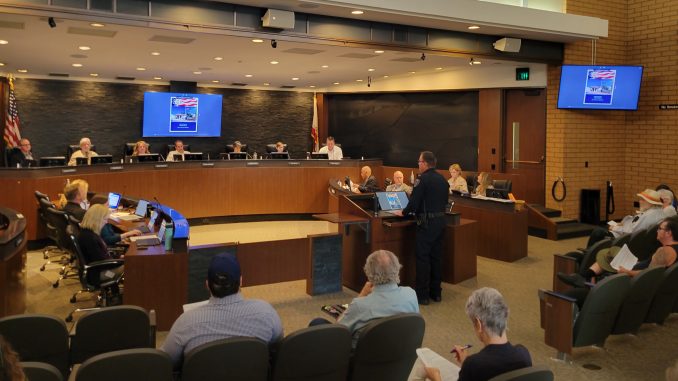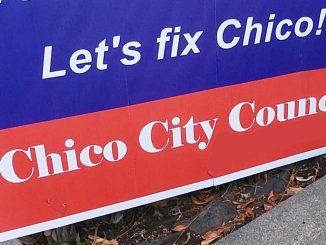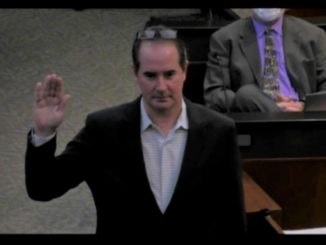
What is “quality of life”? The city of Chico has a definition of sorts in its vision statement, which calls for the city to be “a safe place to raise a family, an ideal location for business and a premier place to live.” Dictionary definitions include “the standard of health, comfort and happiness.” None are particularly specific.
That proved the crux of the issue Tuesday night (June 21) when Chico Vice Mayor Kasey Reynolds proposed the City Council place on the November ballot a voter initiative titled “Protect Chico’s Quality of Life Act.” As drafted, it would require all future councils to “use all legal means available, including the enforcement of existing and the enactment of new laws,” to preserve quality of life—established as safety, cleanliness, beauty and economic vitality. Further, it “provides a means for citizens and businesses to hold the city accountable” (i.e., receive compensation) should the city not abate nuisances.
Discussion of the initiative, which followed the police department’s annual report and the city’s shelter crisis plan, brought to light how broadly terms can be interpreted. Speaker Julie Threet observed that “safety means a lot of things to a lot of people”; to her, it’s about schoolkids sitting in dilapidated classrooms wearing masks. She’d consider a vaccine clinic from Butte County Public Health at the mall a nuisance for the city to abate.
Melody Proebstel told the council how she taught Chico State students about the concept of privilege, “not having to think about something,” and so “what looks like safety to me may look different to someone else.” She encouraged consideration of how each element delineated within quality of life “would look for the entire community.”
Katy Thoma, executive director of the Chico Builders Association, said the developer group supported the idea in principle—they’re looking forward to how it would be implemented “without unintended consequences.”
That’s where the council landed. Sean Morgan, aligned with Reynolds in the conservative majority, suggested the initiative merited a comprehensive review by City Attorney Vince Ewing, whose office had not vetted the proposal. In response to questions from Mayor Andrew Coolidge, Reynolds said a constituent supplied the language based on a Sacramento city initiative on the November ballot (the Emergency Shelter and Enforcement Act).
Councilman and former police chief Mike O’Brien, saying such an action “must pass legal muster,” made a motion to have Ewing’s office analyze the draft. Morgan seconded, and both accepted a friendly amendment from Reynolds that Ewing present a “ballot-ready initiative” at the next regular meeting, July 5, due to the tight timeline. The council voted 6-1 in favor, with lone progressive Alex Brown dissenting.
“I feel like a broken record, but we keep getting the same narrative from this council,” Brown said by phone the next morning. “First of all, this ballot initiative appears to be so broad that it puts us in a very serious liability situation. … It is broad in a way that I don’t think can be narrowed. And it looks very performative—I can see Chico citizens reading it and saying, ‘That looks good,’ and potentially voting for something like this; but when I read it, it looks a whole lot like bad policy to me.
“It looks like policy that reinforces the narrative of us versus them. It reinforces the narrative the enforcement is the way to solve social problems. It reinforces the narrative that the citizens who are unhappy should be able to get money from the city.”
Morgan told the CN&R after the session that he wanted to avoid another Warren v. City of Chico lawsuit, in which a federal judge ruled that the city violated the Constitution in enforcing ordinances (anti-camping in this case).
“The vice mayor’s idea for this, whether it came out of Sacramento or somebody in the audience wrote it, is fine—it’s a good framework,” he said. “How do we move forward with something like this? And is it feasible? If it’s not, let’s find out it’s not; then we’re still in the same boat. If it is, let’s go get it. We’ll find out.”
Reynolds told the CN&R, “I just provided a draft and knew it would need to be reviewed; that was what I expected. You have to start the conversation. I wanted to give us a framework … we’ll shore it up the best that we can and get something forward for the voters.”
She said she heard about the Sacramento initiative from constituents and added: “Knowing what we’re going through in our community right now and that we’re focused on one particular thing [homelessness], I think it’s time we focus on the community as a whole and have an opportunity for everybody to be listened to.”
The item drew 10 public speakers and three online comments—eight in support without reservations. One, attorney Rob Berry, said that “even if nothing practically improves because of this initiative, it’s an opportunity for this community … to state in a unified voice that this community is not nearly as divided on these issues of quality of life as we hear or we’re told.”
Brown told the CN&R that the notion “even if it doesn’t hold up, it makes a clear statement” is “not good policy. Policy should lead to a specific result; it should lead to something done. If it was never the intention to have things being done as a result of whatever this is, we’re headed in the wrong direction.”
Other issues
Police Chief Matt Madden presented his department’s annual report, going over each of the 36 pages. The document posted online breaks down police activities and crime statistics for 2021; Madden offered context.
Among his remarks, the chief noted that he had discretion over just 5 percent of the police budget ($29.4 million in 2021-22); how 2020 presented unusual circumstances for comparison because of the pandemic (e.g., shelter in place orders); that Chico PD has completed deescalation training, ahead of schedule; and officers used force in less than two-tenths of a percent of their encounters (81 incidents in 49,078 calls for service).
Brown asked for clarification on how the department defined “use of force”; Madden replied that Chico PD considered measures an officer takes beyond placing a suspect in handcuffs without resistance.
Reynolds—a member of Madden’s Police Community Advisory Board, which previewed the report—pointed to the use-of-force statistic as her big takeaway.
“A lot of times when you hear a lot of the naysayers and the defund-the-police and those kind of people coming in, that’s not what is portrayed; it’s that they’re these big bullies going out doing these horrible things,” she told the CN&R. “It’s an amazing number.”
Along with use of force, Brown said she’s focusing on complaints against officers, known as professional standards. The report listed 12 last year, up from four each of the previous two years. Madden cited more robust internal review, incorporating greater use of technology such as bodycams, from which investigators opened five cases. Of the 12 total, administrative investigations exonerated three officers and did not uphold two other complaints. Brown told the CN&R she’d appreciate more transparency in reporting out the process.
Coolidge told the CN&R by phone that he’s looking at 2021 compared to 2019, rather than 2020’s extenuating year-over-year variances. Through that lens, “there are some minor upticks [in crime] that have to be paid attention to,” he said, “but also the fact that we need to continue to strengthen our police department as much as possible and understand we’re a growing city.”
Madden’s report was informational only, but the council needed to approve a state-mandated plan stemming from the city’s shelter crisis declaration. The majority did so on a 6-1 vote, Brown again dissenting, ahead of the July 1 deadline—though in making the motion, Reynolds acknowledged gaps mentioned by each of the four public speakers.
The plan comprises the city’s actions in response to Warren v. Chico and documents collated by Ewing’s office: the settlement agreement, plans for the Pallet shelter and the city’s Low Cost Housing Resource Guide. Citizens asked about the absence of data points and intentions moving forward.
“For me, if felt obligatory,” Brown said of the plan submitted for approval. “It lacked effort, and it wasn’t something I was interested in putting my name behind.”
Coolidge told the CN&R that the council needs to revisit the plan, “to dive into it more in depth. The long-range planning is a big part of this, and to some extent it was lacking.”
In the meeting’s other notable action, the council unanimously instructed the Public Works Department to collaborate with the Downtown Chico Business Association on placing more trashcans downtown. The city has budgeted $65,000 to add and replace cans.




Be the first to comment